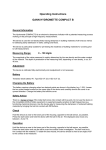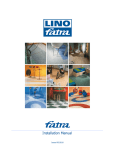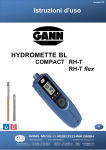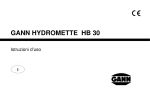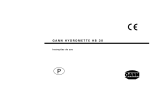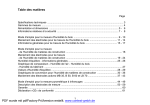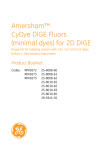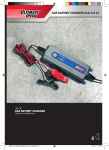Download Operating Instructions HYDROMETTEBL
Transcript
Version 2.0
Operating Instructions
HYDROMETTE BL
COMPACT RH-T
RH-T flex
EN
Hydromette BL Compact RH-T
1
Table of Contents
0.1
Publication Statement .............................................................. 4
0.2
General Notes............................................................................ 5
0.3
WEEE Directive 2002/96/EC Law on Electrical and
Electronic Equipment................................................................ 6
1
Introduction ................................................................................... 7
1.1
Description ................................................................................. 7
1.2
Device Layout and Button Assignment ................................. 8
1.3
Display Symbols........................................................................ 9
2
Basic Functions ......................................................................... 10
2.1
Switching on the Device/Ready Mode................................. 10
2.2
Display in Measuring Mode .............................................. 11
2.3
Setting Menus.......................................................................... 12
2.4
3
2
2.3.1
Measurement Menu (Main Menu).......................... 12
2.3.2
Measuring Mode Selection Menu (Ring Menu)... 13
2.3.3
Ma ximum Value Display.......................................... 16
2.3.4
Minimum Value Display........................................... 17
2.3.5
Saved Menu .............................................................. 18
Other Functions ....................................................................... 19
2.4.1
Automatic Switch-off ................................................ 19
2.4.2
Battery Monitoring .................................................... 19
Specifications ............................................................................. 20
3.1
Technical Data......................................................................... 20
3.2
Prohibited Environmental Conditions................................... 20
3.3
Measuring Ranges.................................................................. 21
Hydromette BL Compact RH-T
4
Application Instructions........................................................... 24
4.1
4.2
Measuring Air Humidity.......................................................... 24
4.1.1
Absolute Humidity .................................................... 24
4.1.2
Moisture Saturation .................................................. 24
4.1.3
Relative Air Humidity................................................ 25
4.1.4
Equilibrium Moisture Content
4.1.5
Water Activity (AW) .................................................. 25
4.1.6
Wet-bulb Temperature............................................. 26
4.1.7
Enthalpy..................................................................... 28
25
Measuring the Temperature .................................................. 28
4.2.1
Dew Point .................................................................. 29
4.2.2
Dew Point Dependent on the Air Temperature and
the Rel. Humidity for Condensation Calculation.. 30
4.3
Handling the Hydromette ....................................................... 31
4.4
Sorption Isotherms.................................................................. 32
5
4.4.1
Building and Insulation Materials ........................... 35
4.4.2
Wood .......................................................................... 39
Appendix ...................................................................................... 41
5.1
Material Table .......................................................................... 41
5.2
References ............................................................................... 42
5.3
General Concluding Remarks ............................................... 42
Graphical short operating instructions in the centre
p. 22-23
Hydromette BL Compact RH-T
3
Introduction
0.1
Publication Statement
This publication replaces all previous versions. It may not be
reproduced in any form or processed, duplicated or disseminated
using electronic systems without the written permission of Gann
Mess- u. Regeltechnik GmbH . Subject to technical and
documentary changes. All rights reserved. This document was
prepared with the required care. Gann Mess - u. Regeltechnik
GmbH accepts no liability for errors or omissions.
GANN Mess- u. Regeltechnik GmbH, Gerlingen, Germany.
07.11.2014
4
Hydromette BL Compact RH-T
Introduction
0.2
General Notes
This measuring device fulfils the requirements of the applicable
European and national directives (2004/108/EC) and standards
(EN61010). Appropriate declarations and documentation are held
by the manufacturer. To ensure trouble-free operation of the
measuring device and operational reliability, the user must carefully
read the operating instructions. The measuring device may only be
operated under the climatic conditions specified. These conditions
can be found in Chapter 3.1 "Technical data". This measuring
device may likewise only be used under the conditions and for the
purposes it was designed for. Operational reliability and
functionality are no longer ensured if the device is modified or
adapted. Gann Mess - u. Regeltechnik GmbH is not liable for any
damage arising from such modifications or adaptations. The risk is
borne by the user alone.
The notes and tables in these instructions on permitted or
normal humidity conditions in practice and the general
definitions of terms have been taken from the specialist
literature. No responsibility can therefore be taken by the
manufacturer for the correctness of this information. The
conclusions to be drawn from the measurement results
are related to the individual conditions and the knowledge
drawn from professional experience for each user.
The measuring device may be operated in residential and
commercial areas, as the stricter class B for emitted
interference (EMC) has been adhered to.
The device may not be operated in the immediate
area of medical equipment (heart pacemakers,
etc.).
The measuring device may only be properly used
as described in these instructions.
Hydromette BL Compact RH-T
5
Introduction
Keep the device and accessories out of the reach of
children!
Gann Mess- u. Regeltechnik GmbH accepts no liability for damage
resulting from non-adherence to the operating instructions or by not
taking proper care during transport, storage or operation of the
device, even if this requirement for care is not specifically
addressed in the operating instructions.
0.3
WEEE Directive 2002/96/EC Law on Electrical
and Electronic Equipment
Disposal of packaging, the battery and the device must be
undertaken in accordance with the legal requirements at a recycling
centre.
The device was manufactured after November 7, 2014
6
Hydromette BL Compact RH-T
Introduction
1 Introduction
1.1
Description
The Hydromette BL Compact RH-T is a precise thermohygrometer for quick measurement of relative air humidity and air
temperature. Using programmed sorption-isotherms, the weight
and mass percentages can be determined for various building and
insulation materials, as well as hardwoods and softwoods. Due to
the thin sensor tube (5.5 mm diameter), it is eminently suited to
moisture analyses, damage evaluation, dehumidifying buil dings
and checking the readiness of floor and wall coatings. Additional
features include single-handed operation, integrated measurement
probe and a 3-line LCD screen for the simultaneous display of air
humidity, air temperature and dew point.
The Hydromette BL Compact RH-T flex T model has a flexible
sensor tube (6.5 mm diameter, swan neck) and is therefore
excellent for measurements of points that are difficult to access.
Hydromette BL Compact RH-T
7
Introduction
1.2
Device Layout and Button Assignment
Sensor
Display
Up button
On/off button
Measurement
button
Down button
8
Hydromette BL Compact RH-T
Introduction
1.3
Display Symbols
Main menu symbols
Air humidity in %
Measured value is held;
ready for measurement
Temperature in °C
Dew point (Dp) in °C
Other symbols
Min/Max display
Air humidity in %
Dead battery
Temperature in °C
Memory location 1
Hydromette BL Compact RH-T
9
Basic functions
2 Basic functions
2.1
Switching on the Device/Ready Mode
The device is switched on by pressing the "on" button
.
After the start phase, the main menu appears in the "rh" measuring
mode (see also section 2.3.2)
Last value measured
in %
"Hold" symbol
Last measured temp. in °C
Calculated dew point (Dp)
in °C
Figure 2-1:
main menu/measuring mode
In this menu, a new measurement can be started by pressing the
measurement button "M".
See also Chapter 2.2
10
Hydromette BL Compact RH-T
Basic functions
2.2
Display in Measuring Mode
Measured value in %
"Hold" symbol signals readiness to
make a measurement
Measured temperature in °C
Calculated dew point (Dp)
in °C
Figure 2-2:
measuring mode
A measurement is started by pressing the "M" button. During the
measurement process, the "%" symbol blinks and the values adapt
to the surrounding conditions. After releasing the "M" button, the
"%" symbol is displayed steadily and the "Hold" symbol also
appears.
The device is now in Ready mode.
Press the "M" button again to start a new measurement.
Approx. 40 seconds after releasing the measurement button, the
device switches itself off automatically to save battery power. If the
device is switched on again, the last value measured is shown on
the display.
Hydromette BL Compact RH-T
11
Basic functions
2.3
Setting Menus
If the"up" or "down" buttons are pressed in Ready mode, the
various setting menus are shown in sequence:
1.
2.
3.
4.
5.
2.3.1
Measurement menu (Ready mode): The measuring
process can be carried out here
Measuring mode selection: Here you can specify the
measuring mode (section 2.3.2)
Maximum value display: The largest value measured is
shown here (section 2.3.3)
Minimum value display: The smallest value measured is
shown here (section 2.3.4)
Saved menu: The last 5 values measured can be called
here (section 2.3.5)
Measurement Menu (Main Menu)
The last measurement with the note "Hold" is shown here.
In this menu, a new measurement can be started by pressing the
"M" button.
During the measuring process, the "Hold" symbol disappears from
the display. After releasing the "M" button, the measured value is
saved. The "Hold" symbol is dis played again.
If the new measured value is larger than the previous maximum
value, "Max" flashes on the display. If the value is not to be saved,
the "M" button must be pressed b riefly. If the value is not to be
saved, a new measurement is started with a long press on the "M"
button without changing the previous maximum values.
12
Hydromette BL Compact RH-T
Basic functions
2.3.2
Measuring Mode Selection Menu (Ring Menu)
In this menu, the various modes for the BL Compact RH-T can be
set.
The currently active mode is selected with a short press of the M
button. The mode then begins to blink. Now a mode can be
selected with the Up and Down buttons and confirmed with a short
press on the M button.
The BL Compact RH-T has 7 different setting modes, which are run
through in the following increasing sequence:
Building material 11-25
EMC
Relative humidity
Wood 32-33
Absolute humidity
Water activity
Enthalpy
Wet-bulb
thermometer
Figure 2-3: measuring mode selection menu
Hydromette BL Compact RH-T
13
Basic functions
The selected mode changes the display of the measurement menu.
Depending on the mode, the appropriate physical dimension is
displayed:
Measuring
mode
"rh"
(relative
humidity):
the relative humidity (in %), the temperature (in °C)
and the dew point (in °C) are displayed
Measuring mode „UGL“(Equilibrium moisture content):
The relative humidity (in %), the temperature (in °C)
and the equilibrium moisture content (in %) are
displayed
Measuring mode "Ah" (absolute humidity):
the relative humidity (in %) and the ab solute humidity
(in g/m³ i.e. grammes of water in 1m³ of air)
Measuring mode "En" (enthalpy):
the relative humidity (in %) and the enthalpy (in kJ/k)
are displayed
14
Hydromette BL Compact RH-T
Basic functions
Measuring mode "to" (wet-bulb thermometer):
the temperature (in °C) and the wet-b ulb temperature
(in °C) are displayed
Measuring mode "Aw" (water activity):
the temperature (in °C) and the water activity (nondimensional) are displayed
Measuring mode "Wood":
the wood moisture (in %), the temperature (in °C) and
the selected wood type are displayed
For information on the wood types, see Chapter 5.1
Measuring mode "Building material":
the material moisture (in weight %), the temperature
(in °C) and the selected b uilding material are
displayed
For information on the building material types, see
Chapter 5.1
Information and explanations on the individual measuring modes
can be found in Chapter 4 "Application instructions"
Hydromette BL Compact RH-T
15
Basic functions
2.3.3
Maximum Value Display
In this menu, the maximum air humidity value measured in a
measurement sequence is displayed. This function is only
available in the "rh" measuring mode.
If a maximum value is to be deleted, the
displayed value must be selected with a short
press on the "M" button.
The value blinks and can now be deleted with
a long press of the "M" button.
Figure 2-4:
maximum value 1
Afterwards, only the "Max" symbol and the %
symbol are still blinking. With a further short
press of the "M" button, the entry is confirmed
and the device returns to the Ready mode.
With the "M" button, a new measurement can
then be carried out immediately.
Figure 2-5:
deleted max. value
16
Hydromette BL Compact RH-T
Basic functions
2.3.4
Minimum Value Display
In this menu, the minimum air humidity value measured in a
measurement sequence is displayed. This function is only
available in the "rh" measuring mode.
If a minimum value is to be deleted, the
displayed value must be selected with a short
press on the "M" button.
The value blinks and can now be deleted with
a long press of the "M" button.
Figure 2-6:
minimum value menu
Afterwards, only the "Min" symbol and the %
symbol are still blinking. With a further short
press of the "M" button, the entry is
confirmed and the device returns to the
Ready mode.
With the "M" button, a new measurement
can then be carried out immediately.
Figure 2-7:
deleted min. value
Hydromette BL Compact RH-T
17
Basic functions
2.3.5
Saved Menu
In this menu, the last 5 measured values are saved. The view and
the respective units depend on the measuring mode selected.
The memory location number "r1" is
displayed for approx. 1 second, and then
the last measured saved value contained
there is displayed.
You can recognize saved values as there is
no "Hold" symbol in the display.
Figure 2-8:
memory location "r1"
As soon as you select the saved menu, the memory location
number "r1" is displayed for approx. 1 second, and then the last
measured saved value contained there is displayed.
The last 5 measured values are automatically saved and stored in
memory locations "r1" to "r5". The last measured value is in
memory location "r1". This is a ring memory. As soon as the sixth
measured value is recorded, the "first" (first measured) measured
value is automatically removed from the memory.
With a short press of the "M" button, the next memory location "r2"
is selected and the value contained there is displayed. After
reaching the 5th memory location, the first is shown again.
The menu can be exited with the up and down buttons.
18
Hydromette BL Compact RH-T
Basic functions
2.4
2.4.1
Other Functions
Automatic Switch-off
If no button is pressed within approx. 40 seconds, the device
switches itself off automatically. The current values are retained
and are displayed again after it is switched back on.
2.4.2
Battery Monitoring
If the battery symbol
appears in the display, the battery is
dead and must be renewed
A list of battery types that can be used can be found in the
"Technical data" chapter.
Hydromette BL Compact RH-T
19
Specifications
3 Specifications
3.1
Technical Data
Display:
3-line display
Display resolution:
0.1 %
Response time:
<2s
Storage conditions:
+ 5 to + 40 °C
- 10 to + 60 °C (short-term)
Operating conditions:
0 to + 50 °C
- 10 to + 60 °C (short-term)
Power supply:
9 V block battery
Approved types:
type 6LR61 or type 6F22
Dimensions:
180 x 50 x 30 (L x W x H) mm
Weight:
approx. 320 g
3.2
Prohibited Environmental Conditions
Condensation, air humidity continuously too high
(> 85 %) and damp
Permanent presence of dust and combustible gases, fumes
and solutions
Environmental temperatures continuously too high (> +50
°C)
Environmental temperatures continuously too low
(< 0 °C)
20
Hydromette BL Compact RH-T
Specifications
3.3
Measuring Ranges
Measuring ranges:
Air:
Humidity:
0 to 100% RH
10 to 90% r.H. (+2% RH)
Temperature:
-20 to +80 °C
0 to +50 °C (+0.3 °C)
Hydromette BL Compact RH-T
21
Graphical short operating instructions
1
Main menu
2
M
M
Measurement
Measuring
mode selection
menu
M
rh blinks
<1 s
Max. value
reset menu
M
M
<1 s
Min. value
reset menu
Max. value
blinks
>2 s
M
M
<1 s
Max. value
blinks
Saved menu
>2 s
M
<1 s
Saved value
1
Memory 1
<1 s
Legends
On/Off button: Device deactivates
itself after 40 s inactivity
M
Press measurement button any
length of time.
M
>2 s
M
M
Hold measurement button
pressed longer than 2
seconds.
Release measurement
button
Press measurement button
briefly.
<1 s
22
Hydromette BL Compact RH-T
Graphical short operating instructions
Softwareversion: V1.03
3
Measured
value
See diagram
measuring mode
selection menu
M
Value deleted
<1 s
M
Value deleted
Main menu
Main menu
<1 s
etc.
00
M
<1 s
Memory 2
Saved value 2
<1 s
Memory 5
Legends
Route to simple measurement:
Press up or down button
<1 s
Up or down for menu
selection
Switch on device – main menu is
displayed
1
Hold measurement button pressed as long
as wanted to carry out a measurement
2
Release measurement button. Measured
value is held ("Hold" appears in display)
3
Hydromette BL Compact RH-T
23
Application Instructions
4 Application Instructions
On the following pages, you will find information on th e various
measuring modes of the BL Compact RH-T (Chapters 4.1, 4.2 and
4.3) and on the operation of the Hydromette.
4.1
4.1.1
Measuring Air Humidity
Absolute Humidity
The amount of water vapour in g/m³ in the air is termed absolute
humidity. The amount of water vapour cannot exceed a fixed
specified amount.
4.1.2
Moisture Saturation
Moisture saturation is the maximum amount of water that can be
contained in a certain volume of air. The higher temperature the
larger the amount of water that can be held in the air.
24
Hydromette BL Compact RH-T
Application Instructions
4.1.3
Relative Air Humidity
The relative air humidity is the relationship between the actual
water vapour content (absolute humidity) and the moisture
saturation. The relative humidity is heavily dependent on the
temperature.
4.1.4
Equilibrium Moisture Content (EMC)
The device is able to display relative humidity, air temperature and
the equilibrium moisture content of wood simultaneously.
This makes it easier for parquet recliners and interior designers to
evaluate whether timber components can be exposed to the
existing climate, or whether damage such as cracking, shrinkage or
swelling is to be feared.
The equilibrium moisture content is the moisture content that wood
will finally reach when it is exposed to a constant climate (i.e.
constant humidity and constant temperature) long enough.
4.1.5
Water Activity (AW)
Water activity is defined as the relative humidity that has to prevail
in the surrounding medium to prevent an exchange of water
between air and material. In practice, it corresponds roughly to the
equilibrium moisture content of a material, but is not given as a
percentage value but as a value between 0 and 1 aw.
The water activity is a measure of the degree of freedom of the free
water (of various types) bound in a material.
Hydromette BL Compact RH-T
25
Application Instructions
The aw value is an important measure concerning the shelf life of
foodstuffs and influences the incidence of microorganisms that
have differing requirements for freely available water. With a lack of
free water, growth processes are slowed or prevented, whereas
others are accelerated. Therefore, the aw value is an important
measure in the chemical and food industries.
4.1.6
Wet-bulb Temperature
The wet-bulb temperature is the lowest temperature that can be
achieved with evaporative cooling.
The release of water from the damp surface is in balance with the
ability of the surrounding atmosphere to absorb water and thus
saturates the surrounding air with water vapour. Because of the
evaporative chill, the wet-bulb temperature is dependent on the
relative air humidity and lies under the air temperature. The
temperature difference is the larger, the drier the surrounding air is.
Using the temperature difference, the relative humidity can thus be
determined.
The wet-bulb temperature (in the drawing (T2)) is determined with a
psychrometric measurement with a thermometer provided with a
damp material cover.
The wet-bulb temperature is mainly of interest where large amounts
of liquids evaporate, such as in wood drying machinery.
26
Hydromette BL Compact RH-T
Application Instructions
Figure 4-1: aspiration psychrometer
Hydromette BL Compact RH-T
27
Application Instructions
4.1.7
Enthalpy
Enthalpy (En) is a measure of the energy content of air-water
vapour mixtures, in kJ per kg.
4.2
Measuring the Temperature
Handling
The device is only suitable for measuring the air temperature (and
the rel. air humidity), not for recording the temperature of solid
materials and liquids. For particularly precise measurements,
particularly for temperatures under +10 °C or above +40 °C, or for
significant differences between the temperature of the sensor or
measuring device and the surrounding atmosphere, the device
should be exposed to the surrounding atmosphere of the
measurement location for approx. 10-15 minutes or until the
temperature has equalised. The measuring range of -40 °C to +80
°C only applies to the sensor tip of the electrode (length of the
protective/filter cap). The measuring device may only be exposed
to temperatures above 50 °C for short periods. False
measurements can arise from shielding with body parts (e.g. hand)
as well as blowing or speaking/breathing in the direction of the
sensor.
The setting time of the air temperature sensor in moving air is
approx. 3 minutes for 90 % of the temperature difference.
The air temperature sensor adapts to the surrounding temperature
even when stored (not switched on).
28
Hydromette BL Compact RH-T
Application Instructions
4.2.1
Dew Point
The dew point is the temperature at which the air is saturated with
water vapour. Condensation occurs below this temperature. The
dew point generally lies below the air tem perature, except with 100
% r.h, where both temperatures are the same.
The dew point is dependent on the air temperature and water
vapour partial pressure and equal to the temperature whose
saturation pressure is equal to the water vapour partial pressure
present. The water vapour partial pressure is calculated as follows:
Further information can be found in the Internet.
Hydromette BL Compact RH-T
29
4.2.2
Dew Point Dependent on the Air Temperature and the Rel. Humidity for Condensation
Calculation
Air
temperature
Dew point in °C at a relative humidity of:
°C
30%
°C
°C
°C
°C
°C
°C
°C
Moisture
saturation =
amount of water
in g/m³
30
10.5
14.9
18.5
21.2
24.2
26.4
28.5
30.4
28
8.7
13.1
16.7
19.5
22.0
24.2
26.2
27.2
26
7.1
11.3
14.9
17.6
19.8
22.3
24.2
24.4
24
5.4
9.5
13.0
15.8
18.2
20.3
22.2
21.8
22
3.6
7.7
11.1
13.9
16.3
18.4
20.3
19.4
20
1.9
6.0
9.9
12.0
14.3
16.5
18.3
17.3
18
0.2
4.2
7.4
10.1
12.4
14.5
16.3
15.4
16
-1.5
2.4
5.6
8.2
10.5
12.5
14.3
13.6
14
-3.3
-0.6
3.8
6.4
8.6
10.6
14.4
12.1
12
-5.0
-1.2
1.9
4.3
6.6
8.5
10.3
10.7
10
-6.7
-2.9
0.1
2.6
4.8
6.7
8.4
9.4
8
-8.5
-4.8
-1.6
0.7
2.9
4.8
6.4
8.3
6
-10.3
-6.6
-3.2
-1.0
0.9
2.8
4.4
7.3
4
-12.0
-8.5
-4.8
-2.7
-0.9
0.8
2.4
6.4
2
-13.7
-10.2
-6.5
-4.3
-2.5
-0.8
0.6
5.6
0
-15.4
-12.0
-8.1
-5.6
-3.8
-2.3
-0.9
4.8
40%
50%
60%
70%
80%
90%
Application Instructions
4.3
Handling the Hydromette
The Hydromette BL Compact RH-T is mainly used for measuring
the relative air humidity in bulk goods and solid materials (e.g.
masonry, concrete, etc.).
To do so, hold the Hydromette at the measuring location in the air,
or insert into the building material, and commence the
measurement. For particularly precise measurements, particularly
for temperatures under interior temperatures (20 -25 °C), or for
significant differences between the temperature of the sensor or
measuring device and the surrounding atmosphere, the device
should be exposed to the surrounding atmosphere of the
measurement location for approx. 10-15 minutes or until the
temperature has equalised. The sensor adapts to the surrounding
temperature even when not switched on.
Condensation occurs on all parts in a room that are cooler than the
dew point.
No adjustment of the sensor is necessary.
Response time of the air humidity sensor
The response time is delayed by the filter material in the metal
tube.
The response time of the air humidity sensor in slightly moving air
is approx. 5 minutes for 90 % of the humidity difference with a
surrounding temperature of 20 to 25 °C, and approx. 15 minutes for
95 % of the humidity difference
By moving the device (ventilating the sensor), the response time
can be reduced in stationary air or with very little air movement.
Hydromette BL Compact RH-T
31
Application Instructions
4.4
Sorption Isotherms
Sorption isotherms describe the equilibrium state of the sorption of
a material on a surface at a constant temperature. In this
equilibrium state, the relationship between water content and
equilibrium moisture content of the surface (i.e. of the material) can
be described and represented by a curve. Each moisture value can
be allocated to an appropriate water content of the material using
this curve.
Different materials also have different sorption behaviour
depending on the specific properties of the material.
As these processes are extremely complex, the sorption curves are
obtained empirically, i.e. they relate to practical data and
experience. For each material, its own characteristic curve must be
obtained experimentally.
Measuring the relative air humidity/water activity in building
materials
This method is mainly used for measurements at depth in old
building structures where measurements using the resistance
measuring method (sandstone, quarry stone, damp walls with
blooming, etc.) do not provide reproducible results. For this, the
Blue Line Compact RH-T devices with tube lengths of 160 and 350
mm are available. For measurements over a long period at multiple
points or at different depths, drilled holes should be se cured and
closed.
The method for measuring the relative air humidity/equilibrium
moisture content in screeds has been used for a long time in Great
Britain and the Scandinavian countries. Compared to the non destructive measurement or the resistance measurement, it is,
however, more time-consuming and requires suitable drilled holes.
However, it provides very reliable results when an equilibrium
moisture content is sought. This method also increases the
32
Hydromette BL Compact RH-T
Application Instructions
reliability where there is insufficient information on the composition
of the screed.
Handling
For the measurement, a hole with a diameter of 7 mm or 8 mm
(flex) mm and a depth of at least 40 mm is drilled. The drilling depth
depends on the required measurement depth or screed thickness.
Before making the measurement in the hole, it should be carefully
cleaned of drilling dust and blown out. There must be no free water
in the hole. To prevent an exchange of air in the hole, it should be
sealed.
The equilibrium moisture content in the hole is indicated after
approx. 30 minutes, given temperature equilibrium (same
temperature in material being measured and the sensor tube
sensor).
Damage to the sensor
The sensor can be made irreparable by various mechanical and
environmental influences. These include in particular:
- direct contact of the sensor with the fingers
- direct contact with solid or sticky materials or objects
- measurement in atmospheres holding solutions, oil vapours or
other high levels of contaminants
Measurement errors
Measurements under 20 % r.h. and above 80 % r.h. should not be
carried out over a long period where possible (continuous
measurements). Other false measurements can arise from
Hydromette BL Compact RH-T
33
Application Instructions
shielding with body parts (e.g. hand) as well as blowing or
speaking/breathing in the direction of the sensor.
Warning:
The sensor is not designed for continuous measurements at above
80 % r.h. (longer than approx. 36 hours at once without
regeneration at 30-40 % r.h. in the same period)
34
Hydromette BL Compact RH-T
Application Instructions
4.4.1
4.4.1.1
Building and Insulation Materials
Equilibrium Moisture Content/Household Humidity
The equilibrium values generally mentioned refer to a temperature
of 20 °C and 65 % relative humidity. These values are often
referred to as "household humidity" or as "air-dry". However, these
should not be confused with the values at which the material can
be handled and processed.
Flooring and coatings must be viewed and evaluated in conjunction
with the respective permeability of the material used. For example,
when laying a PVC covering, the later average equilibrium moisture
content is taken as the basis. Please note here the
recommendations provided by trade associations and covering
manufacturers.
When evaluating wall surfaces, the respective long-term
environmental conditions must also be considered. The lime mortar
plaster in an old vaulted cellar can easily have a moisture content
of 2.6 percent by weight, whereas the gypsum plaster in a centrally
heated room would have to be considered as too damp with a
moisture content of 1 percent by weight.
When evaluating the moisture in building material, the surrounding
climate is the primary consideration. All materials are subject to
continuously changing temperatures and air humidity. The
influence of the material moisture depends significantly on the heat
conductibility, the thermal capacity, the resistance to water vapour
diffusion and the hygroscopic properties of the material.
The "expected moisture content" of a material is the moisture level
that corresponds to the average of the equilibrium moisture content
under changing climatic conditions that it is continuously exposed
to. The air humidity values in living areas in central Europe in the
summer are approx. 45 - 65 % rel. humidity and in winter approx.
Hydromette BL Compact RH-T
35
Application Instructions
30 - 45 % rel. humidity. Increased damage occurs in centrally
heated rooms in winter as a result of these variations.
It is not possible to lay down generally applicable values. Much
more it always requires the technical and expert experience to
correctly evaluate the measured values.
With organic building materials, the water content is generally given
in percent by weight, as the hygroscopic water content of the
respective material is to a large extent proportional to the density,
i.e. for all densities of a building material, when giving the moisture
content in percent by weight the same value is displayed. In
percent by volume, with double the density the display will be twice
as high.
For materials not included in the BL Compact RH-T, there are
currently no sorption isotherms confirmed or checked by us
36
Hydromette BL Compact RH-T
Application Instructions
4.4.1.2
Equilibrium Moisture Values in Percent by Weight
Building m aterials
at 20 °C,
approx. 50
% RH
at 20 °C,
approx. 65
% RH
at 20 °C,
approx. 90
% RH
1,5
1,7 - 1,8
3,1
applied rel. w et)
2,0
2,4 - 2,6
3,8
Cement mortar 1: 3
1,5
1,7 - 1,8
3,2
Lime mortar 1: 3
1,6
1,8 - 1,9
3,4
Gypsum plaster, plasterboard
0,5
0,6 - 0,7
1,0
Gypsum screed
0,6
0,8 - 0,9
1,3
Magnesite screed
7,0
8,3 - 8,7
13,0
Xylolite in accordance w ith DIN
11,0
13,5 - 14,5
16,7
Gas concrete (Hebel)
8,5
11,0 - 12,0
18,0
Elastizell screed
1,6
1,8 - 2,2
2,8
Anhydrite screed
0,5
0,6 - 0,7
0,9
Concrete (200 kg cement/m3 sand)
1,4
1,6 - 1,7
3,0
Concrete (350 kg cement/m3 sand)
1,6
1,8 - 2,0
3,4
Concrete (500 kg cement/m3 sand)
1,8
2,0 - 2,2
3,8
Cement screed (sealed),
applied rel. dry)
Cement screed (unsealed,
Hydromette BL Compact RH-T
37
10
38
Dry
20
Central heated room moisture
Normal room moisture
Outside moisture range
Fungus attack
Gypsum plaster %
Mixed plaster %
6
30
8
40
0,5
0,3
12
70
2
10
Normal
60
1,5
50
14
2,5
16
80
1
3
18
2
3,5
20
Moist
90
25 30
100
4.4.1.3
Wood moisture content
(softwood)
0
Relative humidity
Application Instructions
Comparison Graphic of Air Humidity - Material
Moisture
Hydromette BL Compact RH-T
Application Instructions
Notes on graphic in section 4.4.1.3:
The areas shown in the graphic mean:
Ambient climate % r.F.
Material condition
0
70
Dry
90
Equilibrium zone
100
Moist
Light area: dry
Equilibrium moisture content reached.
Shaded area: adjustment area
Caution! Coatings or adhesives without diffusion properties should
not yet be processed. Contact the respective manufacturer.
Dark area: damp
Handling and processing at very high risk!
4.4.2
Wood
Equilibrium wood moisture content – equilibrium moisture
content
If wood is stored in a particular climate for a long period, it takes up
the moisture matching this climate, which is termed equilibrium
moisture content or equilibrium wood moisture content.
On reaching the equilibrium moisture content, the wood no longer
loses moisture if the surrounding conditions remain the same and
also does not take up any moisture.
Hydromette BL Compact RH-T
39
Below are some equilibrium moisture content values that are reached with wood in the conditions given:
Equilibrium w ood m oisture content
Air tem perature in °C
10 °C
Relative air humidity
15 °C
20 °C
25 °C
30 °C
Wood m oisture content
20%
4,70%
4,70%
4,60%
4,40%
4,30%
30%
6,30%
6,20%
6,10%
6,00%
5,90%
40%
7,90%
7,80%
7,70%
7,50%
7,50%
50%
9,40%
9,30%
9,20%
9,00%
9,00%
60%
11,10%
11,00%
10,80%
10,60%
10,50%
70%
13,30%
13,20%
13,00%
12,80%
12,60%
80%
16,20%
16,30%
16,00%
15,80%
15,60%
90%
21,20%
21,20%
20,60%
20,30%
20,10%
Appendix
5 Appendix
5.1
Material table
Material
identifier
Code
11
12
13
14
17
19
20
Description
22
23
25
Cement screed
Anhydrite screed
Concrete
Cement mortar
Gypsum plaster
Lime sand brick
Lime cement mortar
Insulation wood fibre insulating
board
Mineral wool insulation
Brick
32
33
Hardwood/beech
Softwood/pine
Hydromette BL Compact RH-T
41
Appendix
5.2
References
We would like to specifically draw your attention to the fact that the
literature mentioned is only an extract and is not complete. The
individual titles must also be viewed with regard to the respective
usage case.
Trocknungstechnik, Erster Band, Springer-Verlag, Berlin, ISBN:
3-540-08280-8
Wassertransport durch Diffusion in Feststoffen, H. Klopfer,
Bauverlag GmbH, Wiesbaden, ISBN: 3-7625-0383-4
Schadensanalysen, H. Fischer, expert Verlag,
ISBN: 3-8169-0928-0
Schall, Wärme, Feuchte, Gösele/Schüle, Bauverlag GmbH, ISBN:
3-7625-2732-6
5.3
General Concluding Remarks
The notes and tables in these operating instructions on permitted or
normal humidity conditions in practice and the general definitions of
terms have been taken from the specialist literature. No
responsibility can therefore be taken by the manufacturer of the
measuring device for the correctness of this information.
The conclusions to be drawn from the measurement results are
related to the individual conditions and the knowledge from
professional experience for each user. In cases of doubt, for
example concerning the permitted moisture content in coating or
screed substrates when laying floor coverings, it is recommended
to contact the manufacturer of the coating or floor covering and to
take account of the recommendations of trade organisations.
42
Hydromette BL Compact RH-T
Appendix
Guarantee conditions
Gann Mess- u. Regeltechnik GmbH shall rectify material or
manufacturing defects at no cost by repair or replacement of the
defective parts at its choice that occur within six months of
purchase or one year of dispatch from the factory, whichever period
ends first. Neither the replacement nor the repair of a part is
grounds for a new guarantee or an extension of the original
guarantee.
Batteries and other wearing parts such as cables or filter material
are excluded from the guarantee.
When claiming under the guarantee, the device must be sent postfree to Gann Mess - u. Regeltechnik GmbH or the supplier with
details of the claim and accompanied by proof of purchase. The
guarantee is void if repairs or other manipulations have been
carried out by the owner or a third party.
Gann Mess- u. Regeltechnik GmbH accepts no liability for damage
or defective functions caused by improper or incorrect handling or
storage of the device. Gann Mess- u. Regeltechnik GmbH will on
no account accept liability for damage, lost profits, lost usage or
other consequential damage that arise from the use of the product
or the inability to use it.
-Subject to technical changes -
Hydromette BL Compact RH-T
43












































